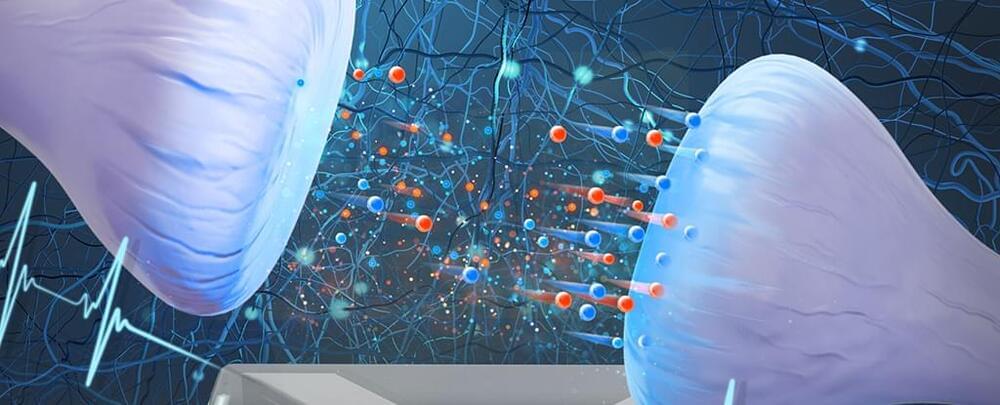Dark energy is one of the biggest mysteries in all the Universe. Is there any way to avoid ‘having to live with it?’
Get the latest international news and world events from around the world.

Scientists Have Created a Functional Brain Cell Based on a Mix of Salt And Water
For the first time, researchers have simulated neurological junctions called synapses using the same water and salt ingredients the brain uses, contributing to an emerging field that combines biology with electronics called iontronics.
The team from Utrecht University in the Netherlands and Sogang University in South Korea claim to have been inspired by the functioning of the human brain, which also uses charged particles called ions dissolved in water to transmit signals within neurons.
An important feature of the brain’s ability to process information is synaptic plasticity, which allows neurons to adjust the strength of connections between them in response to input history.

Aliens are already ‘hitchhiking between planets’, new research suggests
Hitchhiking aliens are already traveling between planets, new research suggests. This theory, known as panspermia, suggests that life’s building blocks are widespread throughout the cosmos and can travel between different areas in space.
The panspermia hypothesis has been sparking fierce debates for centuries. Anaxagoras, a Greek philosopher from the 5th century BCE, proposed the idea that life exists everywhere in the universe, coining the term panspermia to describe the concept of life traveling between planets as seeds.
Other Greek philosophers such as Anaximander and Thales also discussed the philosophical aspects of the panspermia theory.

A longevity researcher is facing backlash for claiming to ‘reverse aging.’ Scientists say there’s no consensus on what it means
Harvard researcher Dr. David Sinclair has found himself at the center of controversy within the longevity community.
Sinclair has been a poster child of the longevity movement for years. He’s built several biotechnology companies focused on reversing the effects of aging, won acclaim for his research, and cultivated a loyal base of fans who swear by his lifestyle tips.
He’s also earned his share of critics who say his research isn’t always backed up by sufficient evidence. But over the past months, The Wall Street Journal reported that Sinclair has been battling a new level of backlash from colleagues and researchers who say his claims on curing aging have gone too far.

Study Shedding New Light on Earth’s Global Carbon Cycle could Help Assess Liveability of Other Planets
Research has uncovered important new insights into the evolution of oxygen, carbon, and other vital elements over the entire history of Earth – and it could help assess which other planets can develop life, ranging from plants to animals and humans.
The study, published today in Nature Geoscience and led by a researcher at the University of Bristol, reveals for the first time how the build up of carbon-rich rocks has accelerated oxygen production and its release into the atmosphere.
Until now the exact nature of how the atmosphere became oxygen-rich has long eluded scientists and generated conflicting explanations.


Quantum Breakthrough when Light makes Materials Magnetic
The potential of quantum technology is huge but is today largely limited to the extremely cold environments of laboratories. Now, researchers at Stockholm University, at the Nordic Institute for Theoretical Physics and at the Ca’ Foscari University of Venice have succeeded in demonstrating for the very first time how laser light can induce quantum behavior at room temperature — and make non-magnetic materials magnetic. The breakthrough is expected to pave the way for faster and more energy-efficient computers, information transfer and data storage.
Within a few decades, the advancement of quantum technology is expected to revolutionize several of society’s most important areas and pave the way for completely new technological possibilities in communication and energy.
Of particular interest for researchers in the field are the peculiar and bizarre properties of quantum particles — which deviate completely from the laws of classical physics and can make materials magnetic or superconducting.

Meet Nvidia CEO Jensen Huang, the man behind the $2 trillion company powering today’s artificial intelligence
AI that will be able to predict the weather 3,000 times faster than a supercomputer and a program that turns a text prompt into a virtual movie set. These are just two of the applications for AI-powered by Nvidia’s technology.
Jensen Huang leads Nvidia – a tech company with a skyrocketing stock and the most advanced technology for artificial intelligence.

RIZON class 4 and 5 electric MD trucks arrive in Canada
Daimler’s new, all-electric truck brand made its Canadian debut this week with the official market launch of its battery electric class 4 and 5 medium duty work trucks.
After making its North American debut at the 2023 ACT Expo in Anaheim, California, Daimler Truck’s RIZON brand has continued on a steady march towards production with initial preorders set to open this June. But it won’t just be Americans who can order a new RIZON electric box truck – Canadians will be able to add them to their fleets at the same time.
“Canada is very advanced regarding green energy and infrastructure and is a natural next step for RIZON’s second market,” explains Andreas Deuschle, the Global Head of RIZON. “We are very happy to bring our zero-emission solution to Canadian customers. They are proven OEM trucks with the latest technology from Daimler Truck.”

How much energy can offshore wind farms in the U.S. produce? New study sheds light
As summer approaches, electricity demand surges in the U.S., as homes and businesses crank up the air conditioning. To meet the rising need, many East Coast cities are banking on offshore wind projects the country is building in the Atlantic Ocean.
For electric grid operators, knowing how much wind power these offshore turbines can harvest is critical, but making accurate predictions can be difficult. A team of CU Boulder scientists and their collaborators are working to tackle the challenge.
In a paper published March 14 in Wind Energy Science, a team led by Dave Rosencrans, a doctoral student, and Julie K. Lundquist, a professor in the Department of Atmospheric and Ocean Sciences, estimates that offshore wind turbines in the Atlantic Ocean region, where the U.S. plans to build large wind farms, could take away wind from other turbines nearby, potentially reducing the farms’ power output by more than 30%.